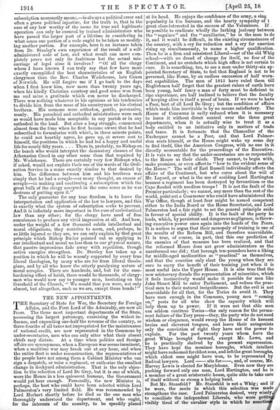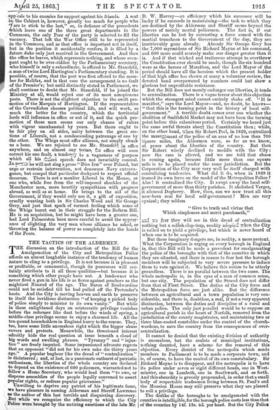THE NEW APPOINTMENTS. T HE Secretary of State for War, the
Secretary for Foreign Affairs, and the First Lord of the Admiralty, are now all Peers. The three most important departments of the State, possessing the largest patronage, exercising the widest in- fluence, and expending one-half the revenue of the country, or three-fourths of all taxes not impropriated for the maintenance of national credit, are now represented in the Commons by under-secretaries, men who can only utter what their absent chiefs may dictate. At a time when politics and foreign affairs are synonymous, when a European war seems imminent, when a maritime war may break out at any hour, and when the entire fleet is under reconstruction, the representatives of the people have not among them a Cabinet Minister who can sign a despatch, or raise a regiment, or authorize the smallest change in dockyard administration. That is the only objec- tion to the selection of Lord De Grey, but it is one of which, were the House in a less quiescent humour, the Government would yet hear enough. Personally, the new Minister is, perhaps, the best who could have been selected within Lord Palmerston's very limited field. He was recommended by Lord Herbert shortly before he died as the one man who thoroughly understood the department, and who ought, for the interests of the country, to be speedily placed at its head. Ile enjoys the confidence of the army, a sing popularity in the bureaus, and the hearty sympathy of t great class interested in the success of the Volunteers. If .
be possible to eradicate wholly the lurking jealousy between the "regulars" and the "auxiliaries," he is the man to do it, and it would be difficult, in the existing circumstances of the country, with a cry for reduction and a cry for exertion rising up simultaneously, to name a higher qualification. Then he is a firm and consistent Liberal—not of the old Whig• school—with no dread of change for itself, no fear of the Continent, and no crotchets which high office is not certain to cure. It is something, too, to see a man under thirty-six ap- pointed Secretary of State, to feel that England is not to be governed, like Rome, by an endless succession of half worn- out capabilities. The men of 1815 have ruled them till Englishmen half forget that the greatest rulers of earth have been young, half fancy a man of forty must be deficient in. ripe experience, are half inclined to believe that the faculty of keeping alive is itself a proof of brain. If we were to have a Peer, best of all Lord Be Grey ; but the condition of affairs which made him inevitable is by no means satisfactory. The House of Commons is sadly reduced when it is necessary to leave it without direct control over the three great departments, when it is actually wise to treat it as a body entitled to an initiative only in matters of trade and taxes. It is fortunate that the Chancellor of the Exchequer cannot be a Peer, and that Lord Palmer- ston seats himself, or the House might wake up some day to find itself, like the American Congress, with no one in it directly accountable for the proceedings of the Executive. It is vain to say that the under-secretaries are as responsible to the House as their chiefs. They cannot, to begin with, make promises, or even affect to "bow to the evident sense of the House." The will of Earl Russell individually affects the affairs of the Continent, but who cares about the will of Mr. Layard, or what is the use of scolding Lord Hartington because a regiment has been destroyed by favouritism or the Cape flooded with needless troops ? It is not the fault of the Premier particularly; we cannot, any more than the rest of the world, point out a Commoner who could have administered the War Office, though at least four might be named competent either to the India Board or the Home Secretariat, and Lord Palmerston had a fair right to set the general principle aside in favour of special ability. It is the fault of the party he leads, which, by persistent and dangerous negligence, is throw- ing executive power once again into the hands of the Peers. It is useless to argue that their monopoly of training is one of the results of the Reform Bill, and therefore unavoidable. It is true, of course, in part, that this one prediction of the enemies of that measure has been realized, and that the reformed House does not grow administrators as the unreformed one did ; that borough ten-pounders have a liking for middle-aged mediocrities as "practical" as themselves, and that the counties only elect the young when they are sure to carry the benefit of their training just when it is most useful into the -Upper House. It is also true that the new aristocracy dreads the representation of minorities, which it feels instinctively would make it possible for men like John Stuart Mill to enter Parliament, and reduce the prac- tical men to their natural insignificance. But the evil is not unavoidable for all that, for the Tories do avoid it. They have men enough in the Commons, young men "coming on," posts for all who show the capacity which will help them up to power. If it were not that able men can seldom continue Tories—the only reason for the perma- nent failure of the Tory press—they, the party who do not need wisdom or eloquence, would sweep the House of its keenest brains and cleverest tongues, and leave their antagonists only the conviction of right they have not the power to explain. For the past twenty years whom have the great Whigs brought forward, except Mr. Lowe, and he is practically shelved by the present supercession. They have kept the nominee boroughs, which intellect might have redeemed foreldest sons, and left the great boroughs, which eldest sons might have won, to be represented by Radical lawyers. Lord — sits for--, and, of course, Mr. Harvey Lewis is elected for Marylebone. Even now they are pushing forward only one man, Lord Hartington, and he is a member of a great aristocratic house, quite able to take care of itself without so strong a helping hand. But Mr. Stansfeld ? Mr. Stansfeld is not a Whig ; and if ti, he were, the mode in which this selection was made strengthens the case. Lord Palmerston desired, very wisely to conciliate the independent Liberals, who were get' visibly tired of the cavalier style in which he some • - .appeals to his enemies for support against his friends. A seat iiy the Cabinet is, however, greatly too much for people who 44 are to stick to the last," so, in defiance of the precedents hich leave one of the three great departments in the ',Commons, the only Peer of the party is selected to fill the r gc, vacancy. That left the War Office still to be represented t in the Commons, and as that office is important not in itself, 1 but in the position it accidentally confers, it is filled by a future duke only just received in the Government. And then the office he leaves, which represents nothing, and whose occu- pant ought to be over-ridden by the Parliamentary secretary, who himself is only a subordinate, is offered to Mr. Stansfeld, .a man of twice Lord Hartington's Parliamentary standing. It is possible, of course, that the post was first offered to the mem- ber for Halifax, and in that case the arrangement is no fault -of the Premier's; but until distinctly stated in Parliament, we -shall continue to doubt that Mr. Stansfeld, if he joined the Ministry at all, would reject one of its most conspicuous posts. There is not the slightest objection to the swift pro- motion of the Marquis of Hartington. If the representative .of the Cavendishes chooses political life, and will work, so much the better for the country, which the territorial lords will influence in office or out of it, and the quick pro- motion of these men seems our only chance of rulers with vigour unexhausted by years. But there ought to be fair play on all sides, unity between the great sec- tions of Liberals, not a condescending patronage of one by the other. The Whigs must offer affiance, not simply chuck us a bone. We are rejoiced to see Mr. Stansfe13 in. office anywhere, and on almost any terms: fz? office will soon -correct his one fault, a tendeny io a vagueness of purpose which all his thileet speech does not invariably conceal. -113-r7a. ne will not sing a prose "Dies Tile" over Poland, but urge or restrain intervention, not denounce Navy extrava- gance, but compel that particular dockyard to respect official decorum. There is not a manlier Liberal in the House, or one who, while free from the self-imposed shackles of the Manchester men, more heartily sympathizes with progress abroad, as well as at home. He brings to the aid of the Government, if they would only use it, a gift of exposition, cruelly wanting both in Sir Charles Wood and Sir George Grey, and just that spark of earnest feeling which some of the Whigs burnt out in their struggle for the Reform Bill. He is an acquisition, but he might have been a greater one, had Lord Palmerston been more careful to avoid the appear- ance of slighting the very men whose alliance he asked, or *throwing the balance of power so completely into the hands of the Peers.































 Previous page
Previous page